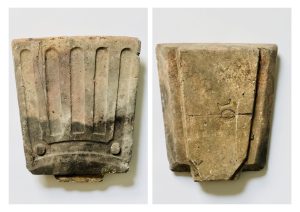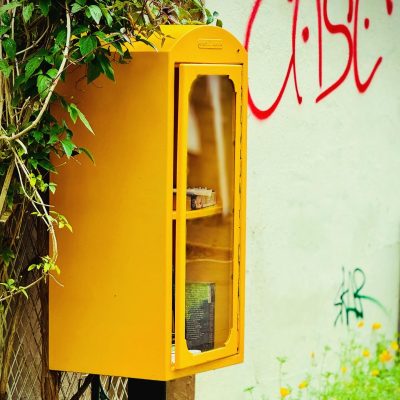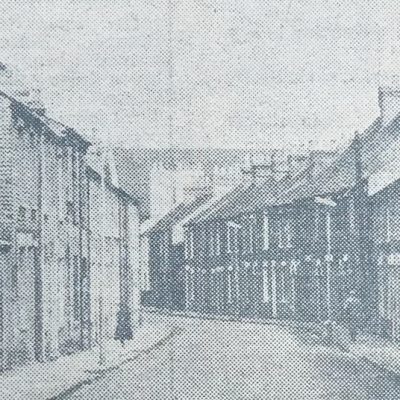Search by topic
- archaeology
- Building of Local Interest
- charity
- church
- crime
- dressmaker
- fire
- Great Eastern Railway
- Listed building
- Mapping Relief
- medieval
- oral history
- poverty
- Public House
- Rattee & Kett
- Religious House
- Roman
- scholar
- school
- Then and Now
- tudor
- women
- work
- world war one
- world war two
Search by text
127 Gwydir Street
History of 127 Gwydir Street
1881
Elizabeth Pettit, head, widow, 53, b Bottisham
Albert D Stearn, lodger, 25, tailor, b Trumpington
James E Arbell, lodger, 21, boiler makers assistant GER, b Suffolk
1891
John Aworth, head, 29, police constable, b Rampton
Kate, wife, 26, b Histon
Cecil , son, 1, b Cambridge
Lillian A, daughter, 5 mos, b Cambridge
Alfred Evans, boarder, 23, police constable, b Cottenham
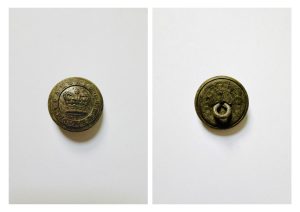
Cambridge Police uniform button found in the garden at 127 Gwydir Street by residents in 2023. Image courtesy Gwydir Street Friends.
John Aworth’s family is found earlier living in Rampton. He was born to John Aworth of Bourne (1798-1877) and Mary Macer who had 5 children. His father passed away on 5 Jan 1877 in Chesterton, Cambridgeshire, United Kingdom.
1893
14.4.1893 Cambridge Chronicle: Alfred FIack, 13, errand boy, of 9, Nelson Street, was charged with having stolen a child’s slate, a coloured sateen Dorothy cloak, of the value of 2s. 6d. the property of Thomas Long Clark, of 34, York Street, from the lobby of the St. Matthew’s Girls’ School, Norfolk Street, on January 9th. The prosecutor identified the cloak as one worn by his daughter when she left home for school January 9th. When she went home to dinner she said it was missing. He next saw the cloak bring worn by a little girl, on Christ’s Pieces, on Saturday last. Sarah Freestone, widow, of 9, Nelson Street, said she was housekeeper to the prisoner’s father. About three months ago the prisoner brought the cloak (produced) to her and said a lady had given it to him. She eventually sold it to neighbour for a shilling. Jane White, wife of Charles White, of 6, Nelson Street, stated that she bought the cloak of Mrs. Freestone for a shilling about three months ago. P.-c. Aworth said that on Saturday afternoon, in consequence of information, he saw the prosecutor at 6, Nelson Street. He afterwards saw the prisoner at Mr. Peacock’s shop in King Street, showed him the cloak and asked him to account for it. The boy said he knew nothing about it. He told him would be charged with stealing it, and on the way to the police station the prisoner said he picked it up in the gutter in Norfolk Street. Annie Clark, aged 8, gave evidence as to missing the cloak. The prisoner elected to be dealt with summarily and pleaded not guilty. He said he picked up the cloak in Norfolk Street. The prisoner was discharged.
1895
In November 1895 the Cambridge Independent Press ran an article titled ‘an insane act’ which reported on John’s appearance in front of magistrates. He was charged with breaking two panes of glass at 6 Selwyn Gardens. John Phypers had approached P.C. Aworth at 1.45am and had said ‘I give myself up for breaking Mr. Ward’s window with a brick’. When asked by the policeman why he had done it John replied ‘Mr Ward has my wife there’. At court John offered no defence and was remanded for a week ‘in order that his mental condition might be inquired into’. It is thought Phypers was hospitalised until his death at Fulbourn Hospital in 1919.
Source: https://millroadcemetery.org.uk/phypers-john/
1901
John Aworth, 40, police constable, b Rampton
Kate, 37, b Histon
Cecil, 11, b Cambridge
Lilian A, 10, b Cambridge
Herbert J, 8, b Cambridge
Daisy, 6, b Cambridge
Frances, 4, b Cambridge
Gertrude, 2, b Cambridge
1903
14.08.1903 Cambridge Independent Press: CAMBRIDGE PUBLICAN CONVICTED For Failing to Admit a Policeman
A somewhat unusual case was heard at the Cambridge Borough Police-court by Dr. J. W. Cooper (who presided), Messrs G. Smith and W. P. Spalding this (Friday) morning, when William Christmas Brown, the licensee of the Jubilee publichouse, Catherine-street, was summoned for failing to admit to his licensed premises John Aworth, a police constable, in pursuance of his duty, who demanded to be admitted on the 6th August.
The case for the prosecution, for which the Town Clerk (Mr J. E. L. Whitehead) appeared, was that about a quarter past eleven on the night in question Pc. Aworth saw a light in the side room of the Jubilee publichouse, the window of which looked out into St. Philip’s-road, and heard the sound of several voices. He knocked at the door of the bottle and jug entrance, which was half glass (the nearest door to the room where the light was), repeatedly for five minutes, and then a woman walked up to the passage leading to the door, and asked who was there. Aworth said that he was a constable and wanted to be admitted. The woman made no reply, but walked away. He continued to knock, and about five minutes later the landlord came out of the folding gates in St. Philip’s-road and asked what he wanted. P.c. Aworth informed him that he wanted to enter the house, as he had been informed that there were several people who had no right to be. Brown refused to let him enter by the bottle and jug entrance, but said he could go in through the gates. He also refused his name, telling the constable to get it from the door outside. The voices inside the house ceased while he was knocking. The defence put forward by Mr. A. J. Lyon was that Mrs. Brown, when she went to the door, did not know it was a police-constable knocking. Even when she did find out, the door was locked, and as her husband had the keys, she went back to tell him. The defendant swore that he went outside immediately and told the constable he could go in the house, but the officer replied that he did nor want to go in by the side gate.
The Bench fined the defendant £1 and 30s. costs, and at Mr. Lyon’s request, fixed the recognizances in the event of an appeal, at £20 each for defendant and two sureties.
1911
Susan Baker, 70, b Great Chishill
G P Merry, boarder, 38, coach trimmer, b Huntingdon
1913
Mrs S M Baker
1962
Mrs Barlow
1970
A Barlow
A collection of artefacts found in the house and garden:

Small lump of coal found under the living room floorboards at 127 Gwydir Street. Image courtesy Gwydir Street Friends.
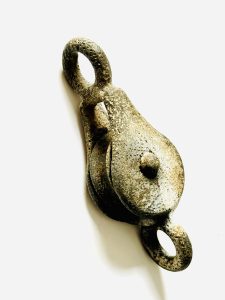
Cast iron washing line pulley found in the garden at 127 Gwydir Street. Image courtesy Gwydir Street Friends.
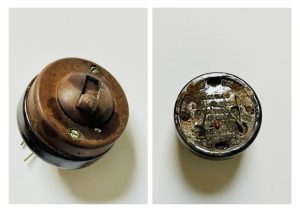
Crabtree bakelite toggle light switch with vitreous base ~1930’s found at 127 Gwydir Street. Image courtesy Gwydir Street Friends.
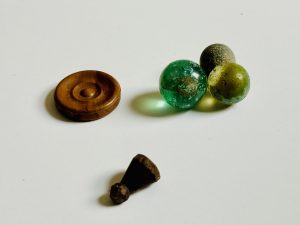
Games pieces (marbles, wooden chess piece, chequers piece) found at 127 Gwydir Street. Image courtesy Gwydir Street Friends.
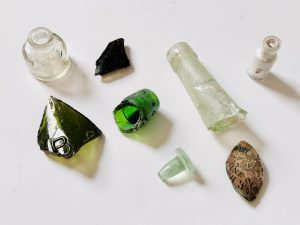
Glass bottles and a bottle stopper found at 127 Gwydir Street. Image courtesy Gwydir Street Friends.
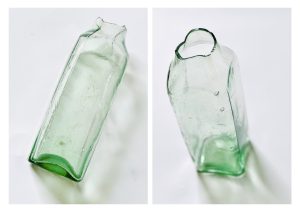
Large green glass bottle with broken top found at 127 Gwydir Street. Image courtesy Gwydir Street Friends.
Contribute
Do you have any information about the people or places in this article? If so, then please let us know using the Contact page or by emailing capturingcambridge@
License
This work is licensed under CC BY-NC-SA 4.0





